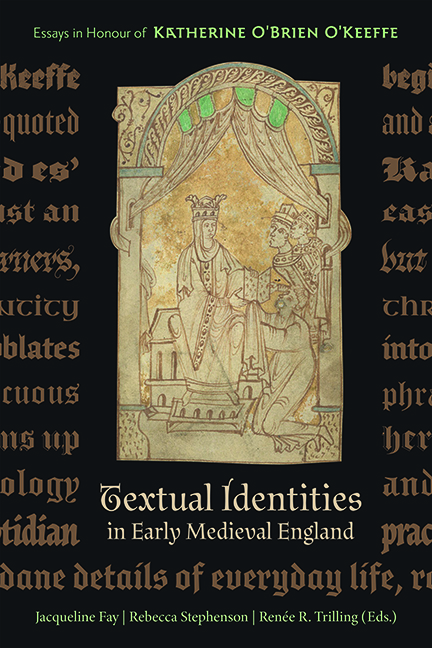Book contents
- Frontmatter
- Contents
- List of Illustrations
- List of Contributors
- Acknowledgments
- List of Abbreviations
- Introduction
- Part One Affect and Embodied Cognition in Medieval Didactic Texts
- Part Two Sovereignty, Power, and English Textual Identities
- Part Three Acts of Public Record in Making and Sustaining Communities
- Overview Of Career
- The Writings of Katherine O’Brien O’Keeffe
- Bibliography
- Index of Manuscripts
- General Index
- Tabula Gratulatoria
- Anglo-Saxon Studies
8 - Abraham Wheelock, Agent of Anglicanism, and the Deployment of Old English Texts in the 1643 Edition of Bede's Ecclesiastical History of the English People
Published online by Cambridge University Press: 26 May 2022
- Frontmatter
- Contents
- List of Illustrations
- List of Contributors
- Acknowledgments
- List of Abbreviations
- Introduction
- Part One Affect and Embodied Cognition in Medieval Didactic Texts
- Part Two Sovereignty, Power, and English Textual Identities
- Part Three Acts of Public Record in Making and Sustaining Communities
- Overview Of Career
- The Writings of Katherine O’Brien O’Keeffe
- Bibliography
- Index of Manuscripts
- General Index
- Tabula Gratulatoria
- Anglo-Saxon Studies
Summary
A Dual-Language Edition of Bede, with Supplementary Materials
THE PUBLICATION of Abraham Wheelock's edition of Bede's Historia ecclesiastica gentis Anglorum marked a historic moment in the development of the scholarly study of Anglo-Saxon England and its textual remains. Issued by Roger Daniel, printer to the University of Cambridge, in 1643, the book was the most important to emerge from the university's presses in the middle decades of the seventeenth century. It included both Bede’s original Latin text and its Old English translation, probably dating from the late ninth century and believed by Wheelock to be the work of King Alfred. The edition presented the two texts in parallel columns, with the Old English version highlighted by its position on the left side of each page and by the use of a larger font and a wider column than those for the Latin (see Figure 8.1). The printing of the Old English represented a significant development in the history of typography: while the Latin text employed an existing Pica font, the Old English was printed in a Great Primer that incorporated newly designed Anglo-Saxon special sorts created for this specific purpose. To Bede's work Wheelock appended an edition – the editio princeps– of the Anglo-Saxon Chronicle, based on the version in MS G (London, British Library, MS Cotton Otho B. XI), which Wheelock borrowed from Sir Robert Cotton's son Thomas and which was subsequently largely destroyed in the Cotton library fire of October 1731. Wheelock's use of the Cotton manuscript gives his publication additional significance: along with Laurence Nowell's transcript of MS G made in the early 1560s, it is now our major source of knowledge of the text of this version of the Chronicle.
To establish his edition of the Ecclesiastical History, Wheelock utilized three manuscripts of the Old English version of the text and three of the Latin, as well as the printed edition of the Latin published at Cologne in 1601. He based the Old English text principally upon Cambridge University Library, MS Kk. 3. 18, made at Worcester in the second half of the eleventh century, to which he had easy access in his capacity as librarian to Cambridge University, a position he had held since 1629.
- Type
- Chapter
- Information
- Textual Identities in Early Medieval EnglandEssays in Honour of Katherine O'Brien O'Keeffe, pp. 170 - 204Publisher: Boydell & BrewerPrint publication year: 2022



